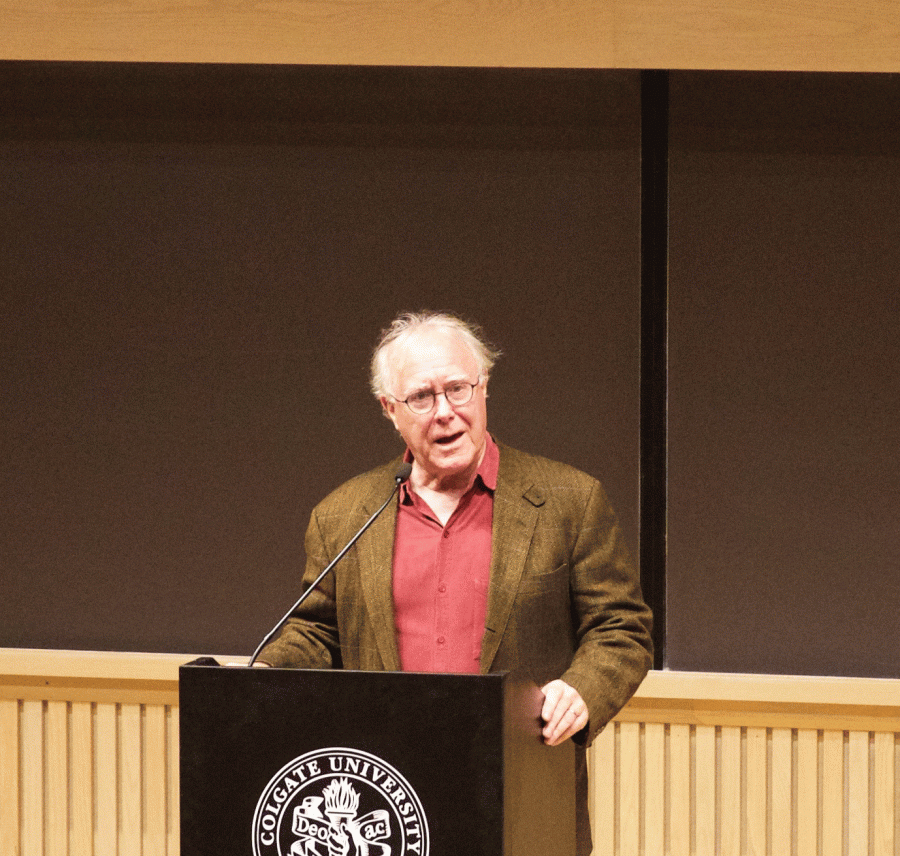Living Writers Series: Powerful Poetry
With his incredible sense of rhythm and soothing voice, Pulitzer Prize-winning poet Robert Hass spoke and read to a large audience on Thursday, October 19, in Love Auditorium for the Living Writers Series. Aside from winning the Pulitzer Prize in 2008, Hass also won the National Book Award in 2007 and the Manhae Prize in 2009, among many other awards.
Hass was introduced by Associate Professor of English Jennifer Brice. She gave the audience some background about Hass, who was born in San Francisco. The west coast is a major inspiration to him, which was easy to see as he read his poetry that describes the beautiful coast.
Hass began his reading very conversationally, explaining the story behind his first poem called “Dry Mountain Air.” This poem was full of incredible imagery of Hass’ grandmother visiting his family when he was a young boy. The sights, smells and sounds he described made the audience feel as if they were right there with him, inhaling the sweet aroma of the chocolate his grandmother brought for him and his brother. This poem was in a prose style of writing that was simple yet full of detail, and even comedic.
At the end of the poem, Hass writes: “My brother/ four years older/ Says this never happened. Not once. She never visited the house/ On Jackson Street with its sea air and the sound of foghorns/ At the Gate.”
This poem was followed by three short poems Hass referred to as “Poet’s Work,” each one more vivid than the next. The first focused on the theme of spilling water, the second had a slightly more serious tone about the loss of the life of a child and the last poem was about the beauty of twilight. These poems, though perhaps simple on the surface, had a deeper, serious and sad meaning to them that made listeners ponder.
In the third poem, titled “Exit Pursued by a Sierra Meadow,” Hass described his beautiful “childhood heaven” and the sadness of leaving and the strength of its beauty. The tall mountains and stunning seasons referenced in the poem seemed to materialize in front of the eyes of audience members.
Hass’ following poem “Drift and Vapor (Surf Faintly),” also in a prose style, allowed listeners to observe a private conversation between two lovers discussing their relationship. It almost felt intrusive to listen in, but at the same time Hass established a feeling of comfort that spread to the audience.
The fifth poem was different from the rest, due to its historic focus. “An Argument of Poetics Imagined at Squaw Valley After a Night Walk Under the Mountain” combined historic views of Polish poets with philosophical opinions and strong imagery of this foreign setting. The fact that Hass is able to describe a foreign setting just as well as he is able to describe his childhood home is stunning, and the audience felt right there with the Polish poets in the winter of 1943.
The final series of poems that Hass read were more recent works, that focused on the theme of death. One was called “Patches of Snow in July,” and concerned the sudden death of one of Hass’ beloved nephews. Hass’ ability to speak of death and suffering with such grace was stunning and beautiful. The rest of the poems all dealt with death at different ages: childhood, adolescence, 20s and 30s. Hass wrote about how experiencing the death of a loved one or a stranger makes death so real and so raw. Each poem changed styles to suit the age that was being mourned.
After his reading, Hass invited the audience to ask him questions about his work. Hass explained his interest in finding relationships between unrelated subjects to strengthen his message in his poems. Doing so is definitely a talent of Hass’, as the audience could hear from his meaningful and complex writing. Hass said that through hearing poetry for the first time, he discovered a way to speak the truth. In a world of lies, poetry does not lie and instead reveals the truth, which is something that means a lot to Hass.
Hass was also asked if he had an intended audience. “No, people who aren’t poets read poetry mostly to get in touch with the voices inside of them,” Hass said.
Hass is definitely a poet skilled enough to help his readers do just that.
Contact Sasha Balasanov at [email protected].






